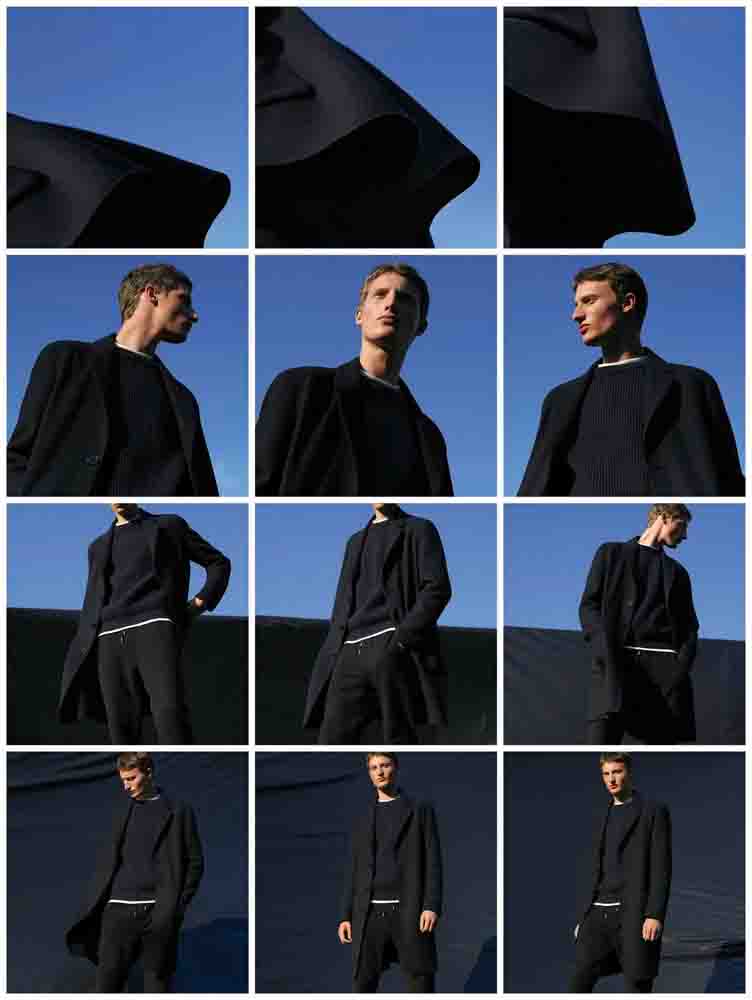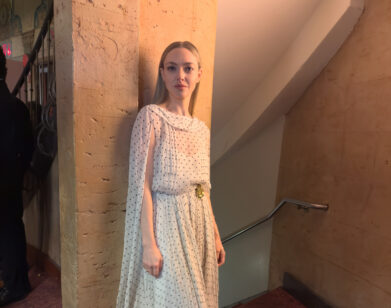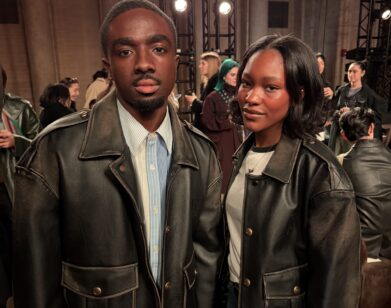The Beauty in the Basics
Christophe Lemaire is a no frills, no fuss designer. After working as the artistic director of Lacoste and Hermès, Lemaire decided to give his full attention to his independent fashion brand, Lemaire, with partner Sarah-Linh Tran. The brand, which focuses on elevated pieces for everyday life, completed two very successful capsule collections with Uniqlo (both of which were called Uniqlo x Lemaire). When the time came for a third collection, however, Lemaire wanted to take his role at Uniqlo one step further, even if it meant personally devoting less time to his growing independent brand. “[It was] a little bit agitating, because I had just decided to focus on my own brand,” Lemaire explains. “I didn’t want to go back to more discussion, but I felt it was really something interesting to do, and I always dreamt of working for Uniqlo.”
This summer, Lemaire was appointed as artistic director of the new Uniqlo Paris R&D Centre, where he leads research and development for the LifeWear brand, and has designed a new Uniqlo line, Uniqlo U. The line takes clothing basics to a new level, focusing on quality and luxury to redefine Uniqlo’s familiar essentials such as t-shirts and down jackets. The result is what Lemaire has strived to do with his own brand—everyday clothing for everyday life—for a wider audience. “It’s a little bit of a humble approach, putting the same level of heart and passion that you can have in high fashion, but into an industrial product,” says Lemaire.
NATALIA BARR: You said that you left your role at Hermès to focus on your own brand. Is your own brand still such a big priority for you?
CHRISTOPHE LEMAIRE: That’s why I hesitated. I really thought about it a lot. I just wanted to make sure I would be able to set the right team, because I very much believe in the collective work and the team dynamic. With the right team, you can really save so much time and energy. Whereas if you don’t have the right environment and the right support from the company, or the right team, it can be extremely tiring and frustrating. Today, I can say I have this great team at Uniqlo and of course at Lemaire. Also, at Lemaire, there is Sarah-Lin [Tran], my partner. We decided to not work together on this new Uniqlo project, so she would focus more on Lemaire, and I spend my time between Uniqlo and Lemaire. With great teams on both sides, it works—it’s exciting and inspiring.
BARR: How did your past roles at other brands prepare you for this role you have now?
LEMAIRE: Being a head designer or art director or just even a designer, you need a certain level of experience and maturity. It’s true that I’ve made mistakes, but I know I shouldn’t do them again. [There are] so many things I’ve learned, and I’m still learning, actually. At Lacoste, I learned how to drive in a very conservative environment. I had to learn how to do politics, how to talk, how to explain, and how to communicate a vision, and the necessary link between marketing and creative teams. Also, very important, the shop experience, which was actually very frustrating at Lacoste. At Hermès it’s different. I learned, maybe more than anywhere else, how to work around a legacy, and how to integrate a strong brand culture into my work. Also, to work with a completely different projection system and craftsmanship. Every company, of course, teaches you so much humanly and professionally [about] yourself and your creative process.
BARR: What is it about Uniqlo that made you dream of working there?
LEMAIRE: If I really think about what drove me from the beginning to become a designer, it is really the idea of trying to make everyday life a little bit better—to make it more functional, more desirable, to improve quality of life somehow. Through designing clothes, I try to bring solutions to people, and I’m interested in the everyday relationship we have to clothes. I’m not a designer who is very interested in baroque or in fantasy or in the fantastic side of fashion. This exists and this is important, but I’m interested in the very real dimensions. I’m interested in the poetry of reality. I try to bring as much taste, smartness, quality, functionality, and aesthetic qualities to everyday clothes. I’m interested in the intimate relationships we can have with those good clothes that we may have in our closets. I think we all have those particular pieces of clothes that we really like, because it ages well, because it fits you well, because you feel comfortable, and you feel confident in those clothes. All those aspects of good design are what I’m interested in. I’m trying just to do good clothes, clothes that you need as much as you want. For me, Uniqlo is an amazing environment. They have an amazing production system, and they have this capacity of bringing the best quality at the best price. There is something very democratic about it, which I really appreciate.
BARR: What was the inspiration for the Uniqlo U collection?
LEMAIRE: When we met with my team to start the very first collection, I told them, “Let’s forget about themes and mood boards. Let’s start from a different point of view. You have to leave for two months all of a sudden. What would you put in your suitcase? What are the twenty essential pieces that you will need and how would you design it to be cool, and you’ll want to wear it?” That’s just a different approach. It’s about trying to propose, every season, the perfect wardrobe of elevated basics.
BARR: How is this collection different from your past collaborations with Uniqlo?
LEMAIRE: The past collaboration was very much a collaboration between Lemaire and Uniqlo. It was very much Sarah-Lin and I bringing a Lemaire twist to a Uniqlo environment. This one was different, because we really are extremely faithful to the DNA. I had to convince Uniqlo about that because at first, they wanted us to do a new collaboration. Then we said, “No, we have to focus on our brand.” Then they said, “Why don’t we put your name on the label, and it’s Christophe Lemaire for Uniqlo?” And I said, “No. Fashion people will care, but I don’t think Uniqlo consumers will. Let’s try to bring more style into basics, and let’s touch real people all around the world, people who don’t really care who Christophe Lemaire is.” It’s not a short designer collaboration. The idea is to bring another layer of constant product that is Uniqlo, and complementary to the main line.
BARR: How do you approach designing a collection that is meant to carry basics in a fresh and artistic way?
LEMAIRE: This is what I’ve always been interested in, trying to make timeless, functional, real clothes. Everywhere I’ve been working, I always had in mind the final destination of the clothes, which is the consumer. For me, the fashion show, the image, the shooting, is just a step. It’s just a moment, but it’s not the final destination. There are so many things to do within that concept of basic with a twist. It’s very subtle. It’s a thin line between becoming too fashionable or becoming boring. You have to find this balance to create something that is obvious, but at the same time exciting. I don’t know if we achieved that, but this is what we had in mind. How we get to that, it’s difficult to explain. It depends, but it might be the color, the details, or the choice in the material. I’m proud of what we came up with in terms of product. I don’t think a fast fashion brand can really say the same about the quality of the product. We come up with products that are of good qualities in terms of lasting and the way it ages. If not, it’s a failure for us.
BARR: Do you have a favorite piece or part of the collection?
LEMAIRE: That’s a tricky one. The sweaters are amazing. The knitwear is very good quality. My personal favorite is a simple crewneck sweatshirt for men that I wear every day, just because of the quality of it. It’s a French terry. It’s quite heavy and round. We were actually surprised to be able to do that for Uniqlo, because even in the good sportswear, streetwear brands, you can’t find that quality. Simple things like that, that make my life easier.







